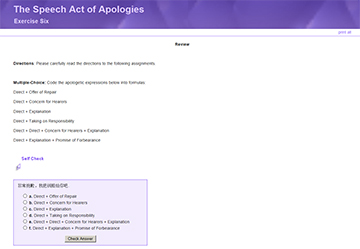Review Two
This unit reviews different combinations of direct and indirect apology strategies in Chinese as well as two social variables that possibly affect the choice of apology strategies in Chinese.
1. Combinations of Apology Strategies
When apologizing in Chinese, speakers can choose a mere 对不起 that would work appropriate for certain situations. For other situations, speakers may choose to combine direct and indirect strategies to intensify the force of apologizing. For example,
对不起,你别生气了。
真不好意思,我早上起床晚了。
真是很对不起,最近太忙了,明天我就把房租给你。
2. Social Variables Affecting Chinese Apologies
Previous studies on Chinese apologies have reported that the choice of apology strategies is affected by different social factors and individual variables. Unit 6 only introduces the effects of two social variables, social distance and severity of offence, on the choice of apology strategies in Chinese.
Generally speaking, if other factors are the same, the use of direct apology strategies increases with the increase of social distance between the interlocutors (e.g., Guo, 2002; Wang, 2003). In other words, the speaker will be more likely to use direct strategies to apologize to a person with distant relationship. This is also constrained by politeness in Chinese. With regard to the possible effects of severity of offence, it has been reported that Chinese speakers tend to use more direct and elaborate apology strategies if the past offence that the speaker has made is more severe.
Unit 6 offers only a general summary of how these two variables (i.e., social distance and rank of imposition) possibly affect the choice of apology strategies in Chinese. When it comes to real-life communication, a variety of variables and/or factors often interact with each other, which makes the task of appropriately making apologies not an easy task at all. Therefore, it is highly recommended that students should pay close attention to how Chinese speakers make apologies in everyday communication and consciously use what they have learned from this website to help analyze the apologetic expressions they hear in daily life.
Exercises
To access the exercises in this unit, please click the Review link.
